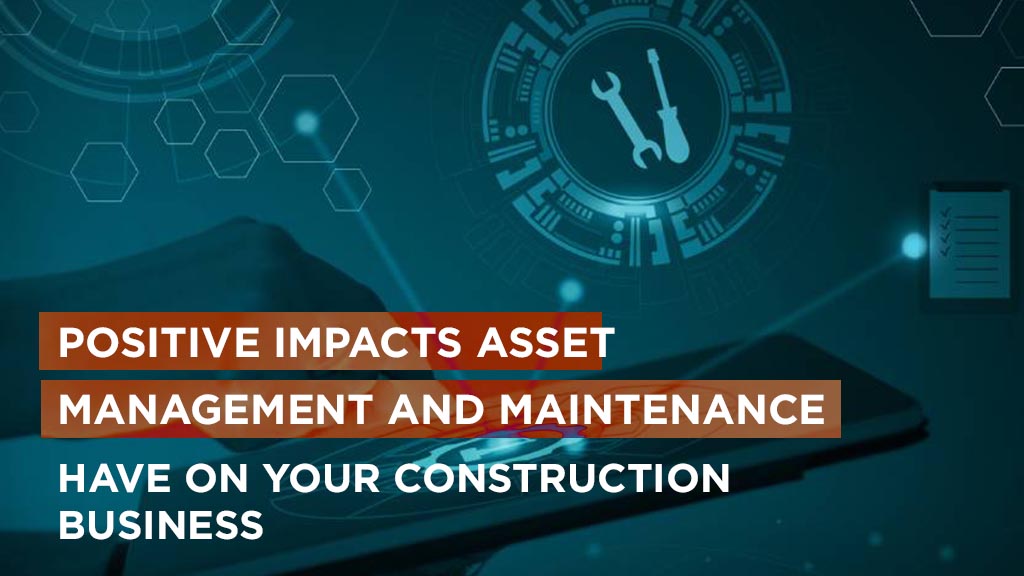In the construction business, every company, be it large or small, depends on tools, trucks, equipment, and other assets. Managing such huge logistics for large construction projects might be difficult.
Practicing a good asset management and maintenance system will help run the business easily and effectively. In this blog, you will come to know various aspects of asset management that will surely help you elevate your construction business.
What does Asset Management do for Construction Businesses?
Asset management helps in collecting, supervising, monitoring, and tracking an organization’s assets. A successful asset management system always enhances the capability of a firm’s utilization of resources, loss and theft, supply levels, waste, equipment upkeep, and last but not least, expenses.
The concept of asset management has been around since the beginning of construction businesses, and since then it has powered companies with important applications. When a construction company successfully executes it, asset management solves huge concerns plaguing a firm, allowing it to grow more effectively.
Asset management and maintenance are two key parts of an effective business management strategy. Unfortunately, it’s often ignored as a mundane job that’s not very exciting. However, experts say companies should not perceive this way as asset management critically helps every business in making it profitable and also provides value to both the company and its stakeholders.
Asset management and maintenance is one such department that involves people from all divisions and business areas, from COOs and department heads to auditors, engineers, and even IT experts and equipment operators.
What is an Asset Manager?
An asset manager is an individual who is responsible for managing a specific group of assets. The job responsibility of the asset manager includes money saving through asset tracking and bringing more efficiency in reducing waste.
The manager also has to develop and perform an asset management strategy, ultimately managing the asset handed over to him. Traditionally, construction companies preferred having third-party asset managers who act as fiduciaries.
However, there has been a slow and steady development toward in-house management of assets with the help of those outsourcing asset management companies.
Asset managers employ analysts and researchers for tracking the performance of assets, give solid investment advice, and taking care of other tasks that could impact the performance of the assets. Particularly, asset managers help in finding high-growth investment opportunities before anyone else.
Asset managers are only persons who have to know the working process of various departments, finance, administration, operations, and capital, and have a complete understanding of the shareholders of a business.
How do Asset Managers Perform their Duty?
Asset managers take the help of asset management software. It is a tool that helps companies make their revenue-driven assets more usable. Particularly those assets are important to the daily operations of any business.
Asset management software provides a detailed perspective of the lifespan of an asset, from acquisition to deployment to maintenance and disposal of those assets. Tracking the progress of assets using a basic spreadsheet. Evaluating data related to each asset with assets management software, which allows users to make more informed decisions about asset management.
Moving ahead from managers and the software, it’s time to underline the impacts of assets management on a construction firm-
Budget Tracking and Forecasting Accuracy
Every new machine comes in an outstanding and solid shape that performs smoothly. But with time, the machines will get older, and hence their performance will be challenged.
Thus, the idea of efficiency that applies to every machinery changes over time, yet adequately-maintained pieces of machinery operate virtually as well as new machinery pieces that require far less maintenance.
Some construction firms remain in doubt when they buy a certain piece of machinery, much alone when it got its last service. However, regular maintenance performance can make companies able to have an accurate record of completed repairs.
With such information, you will have ample time in hand to replace your equipment. Also, a current asset fetched with real-time information can be accessed by asset managers and other concerned persons company-wide.
Increased Operational Efficiency
Operational efficiency is a critical part of the construction as only site workers (managers, operators, and others) remain responsible on a building site. If they are duly concerned, the ROI for every move your company takes provides higher profit.
Fortunately bolstering construction maintenance operations are the right fit for such places. Since machinery preventive maintenance checks for deterioration and damage, asset management practices maintain all of the parts in an efficient way.
Managing Safety Hazards and Risks
Consistent maintenance and inspection of assets. Offering more safety surrounding a building site by avoiding several potentially harmful situations.
One such example of a harmful situation is a breakdown of a machinery piece in an emergency. The overuse of machinery makes it overheated and finally leads to its collapse. However, with regular maintenance, you would prevent it since you know where and when problems will occur in the machinery.
Asset management helps in reducing these situations and thus becomes an essential tool for cost-saving. Following the practices of asset management can help you manage safety hazards and risks as well as complete your assignment on time.
Warranty Coverage Remains Intact
When heavy machinery contains larger parts, regular maintenance becomes necessary as warranties typically replace only those parts which have undergone consistent maintenance. Regularly maintaining the condition of your heavy machinery. Ensuring the availability of the warranty when required.
It helps in keeping warranty coverage intact and companies get insurance for replacing components and other equipment concerns. This way you can remain assured that not only your equipment is well maintained, but also you are eligible for cashing your insurance.
Conclusion
Asset management involves various aspects of a construction business, be it an asset manager, asset management software or increased operational efficiency, or managing safety hazards and risks, it does everything effectively. If you follow in-house assets management, your business will surely excel.
Also Read, Explore ChatGPT Alternatives When AI Chatbot Overload





